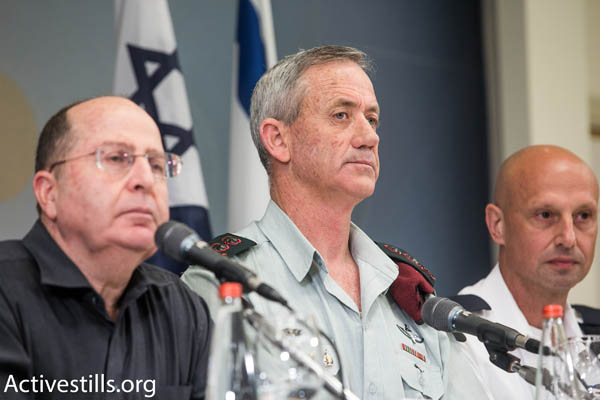Defense Minister Ya’alon has been heralded as the Left’s newest spokesperson after repeatedly speaking out against Israel’s political leadership. Let’s not forget that this is the same guy who called Breaking the Silence ‘traitors.’

After reserving a spot among the “left-wing pragmatists” for openly stating that executing a dying man, and especially while on camera, is not such a good idea, Defense Minister Moshe Ya’alon continues to excite the Israeli peace camp. “Keep speaking your mind — even if it differs from the positions and ideas voiced by senior commanders or the political leadership,” Ya’alon told IDF officers. His summons to the Prime Minister’s Office on Monday for a “clarifications” only strengthens the defense minister’s veneer as an “ethical” person who does not shy away from confrontation with his boss when it comes to issues of principle — such as the Israeli army’s moral character.
Both parts of Ya’alon’s remarks are unclear. As a rule, “to speak your mind” at all times is a poor piece of advice to give adults. Adults are expected to think and weigh their words carefully before saying them in the public sphere. But this advice seems even stranger when given to the people charged with carrying out violent policies: why must I or any other average citizen need to hear what IDF officers have “on their mind?” Why must I be forced to take part in their group therapy session?
Whatever these officers have on their mind does not interest me in the slightest. I am interested in what they do in real time, nothing more. I do not care about their pangs of conscience when they may be taking part in war crimes of any kind. I care about putting them on trial. If they have pangs of conscience, they should refuse orders.
As for the second half of the sentence — one of the problems is that in Israel there is no such thing as “positions of the political echelon.” The political leadership is a weather vane that changes according to the public’s barometer, all while conveying at least five different messages to that public. After all, even the IDF’s ethical code changes according to the trends set by some of Israel’s most violent, extreme right figures, while the political echelon has developed the amazing ability to spout oxymorons as long as they serve its political interests. So which positions are we talking about?
Is the political leadership’s position reflected in Justice Minister Ayelet Shaked’s backing of the Duma murderers when she met with their families, or perhaps it is reflected by condemnations by members of the political echelon? If an officer thinks that killing civilians is wrong, for instance, does it contradict the position of the political leadership? Or perhaps the political leadership of Israel should clearly define its opinion without hiding behind politically correct statements. Even then, it would not be to make Ya’alon’s group therapy any easier on the generals, but rather would become useful should any of the politicians, one day, be put on trial in the Hague.
Let’s not forget that this is the same Ya’alon who called Breaking the Silence “traitors.” He has no real interest in exposing the army’s crimes, nor in changing the policies that make those crimes possible. In fact, his ostensibly brave advice to the officers serve the exact opposite goal: to allow officers a certain amount of virtual ventilation — while earning points as the “most moral army in the world” — and at the same time carrying out a policy of violent oppression against a population under occupation.
Public discourse is certainly important, and one cannot discount the significance of the challenge posed from within the army. However, when such discourse is intended to serve the continuing oppression while minimizing the price for maintaining the system in place, the costs far outweigh the benefits.
This article was first published in Hebrew on Local Call. Read it here.


